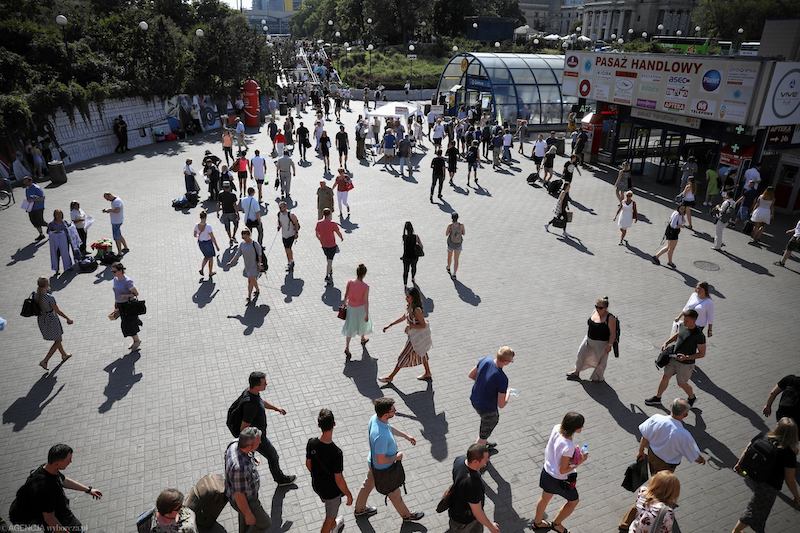Hi from Paris,
I grew up in an unconventional family. During their whole career, my two parents chose to work part-time. They had more time to take care of my brother and I, and as they are now approaching retirement, their life is still packed with involvement in associations. Back then, it was unusual. Now, it’s a trend, at least for those who can afford it.
In thirty years, the working environment has changed significantly. People fully dedicated to their job are not an example for youngsters anymore, or at least not the only one. Young people from the new generation want to take back control of their life, and, as our Polish colleague wrote, they think “the new luxury is not financial freedom but free time”.Some might rightly argue that when you’re struggling to get a decent wage, shortening your hours of work might not be your priority. Others would say the changes underway are the culmination of the individualisation of society. This newsletter could provide them an answer from Italy: collective action also requires more time out of office.
Nelly Didelot, this week’s Editor-in-Chief

I can remember their fatigue all too well. Our parents’ generation subordinated their entire lives to work. They always filled their free time with a list of activities – partly out of financial necessity, and partly because they could not come up with idea how to spend it. Leisure was seen as something for losers, who didn’t care about anything in life. That is why they, who were the first generation to get a whiff of capitalism, entrusted their lives to money.
Working hard, and overhours, was the only way to get by. Consequently, some of us got to know our parents poorly and still miss them. My peers, people aged 25-30, with different points of view and life experiences, all say the same: their parents worked too long hours, and, when bringing up their children, gave too much emphasis to the importance of achieving financial stability.
For our parents, luxury was constituted by all the preys of juvenile capitalism. To fully enjoy it, one had to play by the rules dictated by the free market economy. On the other hand, our generation is slowly writing our own definition of luxury. Its basic ingredient is not financial freedom, but free time. And how much of it an employer can guarantee us may be the scale which determines the labour market, or even turns it upside down.
The four-day working week becomes an inevitable perspective. It is not a mere whim of a lazy neo-liberal society, but a solution with tangible benefits for companies, bosses, subordinates, the inexorably changing climate and the economy itself. Beyond these categories, there is something else. That one extra day of the weekend is also an opportunity given to the next generation. A chance to no longer miss the chance to see anyone, to have the strength to nurture relationships and build a healthy society.

Germany is still divided, at least when it comes to the country’s attitude towards the concept of a four-day week. According to a recent survey 62 percent of the inhabitants of the former German Democratic Republic (GDR) oppose a four-day working week on full pay, but with reduced working hours. In the territory of the ex-West Germany, a majority is also against it, but to a lesser extent: only 54 %.
The most common reason for this scepticism is the fear that it will be too hard for companies to delegate the same duties in fewer hours. Apparently, the experience of the economic model of the GDR or the aftermath of its breakdown have made people more suspicious towards experiments with the organisation of work.

Zemorda Khelifi, a member of green party Europe Ecologie les Verts (Europe Ecology The Greens), is vice-president of the Lyon metropolitan authority. From September, more than half of the city’s 9,600 local civil servants will be able to adopt the four-day week, if they wish.
Why has the Lyon metropolitan authority decided to carry out this pilot scheme?
This trial fits in with the way ecologists see society, where quality of life, health and the environment are paramount. Ideally, we would like to reduce working time to a 32-hour week [instead of 36], but that’s out of our control. On the other hand, we hope to make our jobs more attractive at a time when we are finding it hard to recruit.
What benefits do you hope to gain from a four-day week?
Trials carried out abroad, notably in the UK, Portugal and Iceland, have shown an improvement in the physical and mental health of workers, leading to a reduction in sick leave for employees. This should also have an impact on gender equality in the workplace. 80% of our part-time staff are women. By switching to a four-day week, they will be able to go back to full-time work if they so wish and receive full pay, while retaining a day off.
Doesn’t the inevitable lengthening of the working day run the risk of undermining its intended effect?
That’s obviously a risk. But it will also make it possible to reduce commuting times, which have risen sharply in recent years. According to a survey we carried out in 2021, 50% of our employees have to travel more than thirty minutes between home and work, and 10% have to travel for longer than an hour. Having an extra day without work should also, at the very least, make up for this. It’s also important to remember that this is a voluntary experiment, and we’ll be assessing its effects and staff satisfaction after six months.

“Rather than make this banner, I’d rather prepare a lesson. I can’t afford to go on strike and not get paid. But I can’t afford to not strike in the long term either.”
These are the slogans held up by a teacher on strike for almost a month, showing the dilemmas faced by frontline workers in the Romanian education system.
The majority of teachers are so underpaid they are forced to take second or third jobs. Often, they work as a maths or biology teacher in the morning, and deliver food on a bicycle in the afternoon. That is why the biggest teachers’ strike in 20 years, which involved 300,000 people, kicked off in May. The strike was halted in mid-June, when the government partially accepted the demands.
Prison workers have also stopped work for higher pay, and health workers have gone on a Japanese strike in recent days, wearing a white stripe as a sign of protest.

Beware the time trap. The idea of having more time for oneself is extremely appealing, but be wary of those who turn this into private time. We need more social time. We do need to engage more with politics. Let our sofa not be our fate.
“Italy is a Democratic Republic founded on work”, the country’s Constitution says. As a fact, Italy is founded on precarious work. For decades, our social tissue has been lacerated by precarious contracts, and prime minister Giorgia Meloni made the situation even worse with her “labour day decree“, curtailing limitations to temporary jobs.
Since the pandemic, work from home has also spread. Even those who have a stable contract are now working as though they are hired on performance-based pay. Colleagues meet less; their ability to resist inequality at work is weakened. In Rome, food delivery workers sleep on grassy roundabouts between jobs. Rights slip away from us. Slavery is now 2.0.
Will the four-day week really bring back a balance between the 99 percent and the increasingly rich one percent? It depends on the meaning we give to our free hours. Speaking to crowds protesting against plans to raise the retirement age to 64, French left leader Jean-Luc Mélenchon said we should not merchandise our lifetime. I do agree, but should we conclude we just need more “private time”, as Mélenchon calls it?
We should also resist the privatisation of time: we are deserting cinemas and shared cultural experiences because everyone has their own Netflix. We are no longer joining parties because politicians have given up representing us. Instead of going to restaurants, we order meals with an app. Do you feel freer or lonelier? Let’s take back our time together. Let’s go back to union meetings. Let’s take back politics. Let’s get angry about climate change. Time is worth nothing if we don’t take back hope.
Thanks for reading the 34th edition of European Focus,
Where can you find those extra hours of free time? Days last 24 hours, and weeks seven days, and they are often too short. Should we work less and share jobs and employment? Or could we simply find a way to increase our productivity?
These are some of the questions we need to answer if we are to change the way work shapes our lives.See you next Wednesday!
Nelly Didelot







